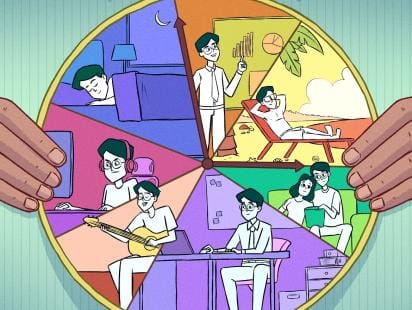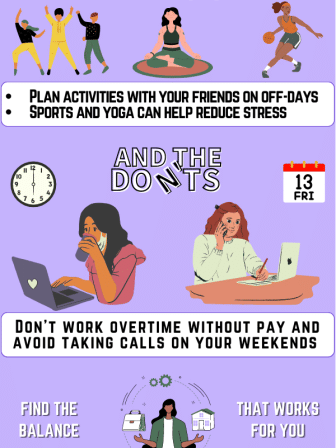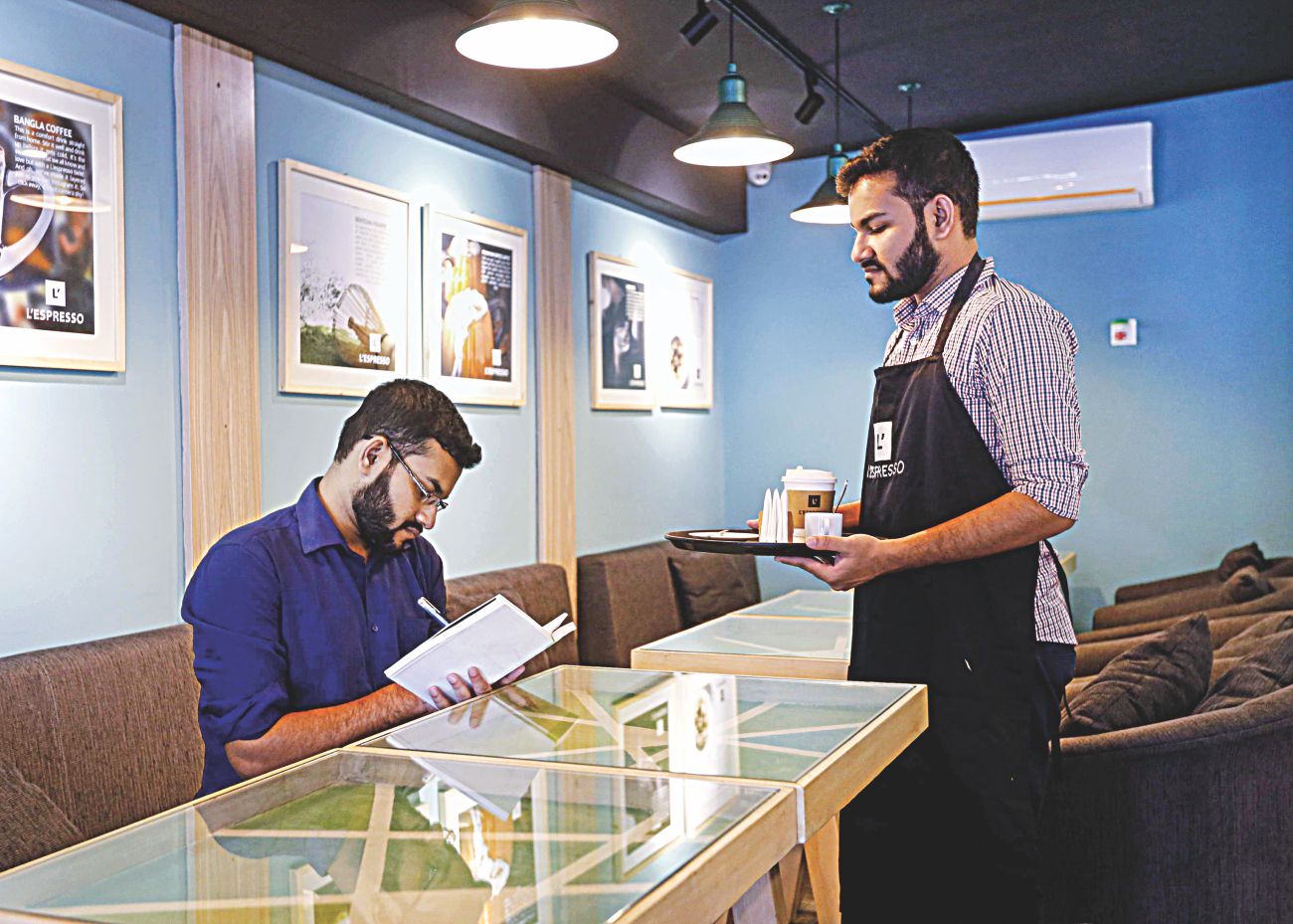Striking a balance between work and life

Touted as an antidote to burnouts and key to increased productivity, the work-life balance is an elusive state or the mythical "best of both worlds" that many aspire to. However, only a few manage to achieve it.
The concept of work-life balance isn't a revolutionary new idea in the working world. It has always been around, but the idea was mostly a matter of preference for the previous generations. For them, it was always overshadowed by other factors such as a stable pay check, job security, and personal development.
Hustle culture, a socially accepted and often wrongly romanticised phenomenon, doesn't seem harmful on a surface level. Working hard is often falsely promoted to being the only key ingredient for success. The danger begins when people can't establish boundaries and the "hustle" turns them into workaholics.

The hustle-and-grind mindset is also heavily promoted in pop culture and social media, so one can't exactly fault them for this mentality. Although, it should be acknowledged that a good number of people adopt a hustle lifestyle out of necessity, it still causes significant harm to a person's way of life.
Shafia Tasnim Nishat, a student of Jahangirnagar University (JU), described what it was like tutoring seven students while being a full-time student herself, "After finishing my classes and a 4-hour commute, I have to spend the rest of my time on my students' academics. While this leaves me no time to relax or socialise with my friends at university, tuition pays well and allows me to be financially independent."
Many young workers have been overworked and underpaid, especially at the early stages of their careers, and the exploitation has left a bad taste in their mouth. It is not uncommon to see advertisements for unpaid internships, even by reputable companies, promising "valuable experience" in place of remuneration.
After dragging themselves through these internships in their student years, young graduates are then met with the dismal starting salaries with unfair workloads that seem to be in vogue in the Bangladeshi professional world.
When asked about her experience in her previous workplace at a Bangladeshi fashion house, Afroza Chowdhury*, a recent graduate from Wrexham Glyndwr University, recalls, "I was first hired alongside another person for a particular task. However, soon after we joined, the other person was fired since the work quota wasn't being met. My responsibilities were doubled, but my salary was only increased partially."

"When the business went through a rough patch, my employers decided to take away the increment they had offered. It genuinely demotivated me to try harder and fully explore my potential. My quality of work deteriorated so I ultimately decided to leave. I was asked to stay back and when I did, they failed to pay me for that time period and it did genuinely hamper my self-esteem and made me question my value," she added.
However, the idea of a better balance between work and other aspects of life has garnered newfound attention in recent times, spurred on by the work-related changes people had to go through during the pandemic.
After working in the hybrid routine, a good number of workers reached the same conclusion – flexible office protocol can still result in the same amount of productivity. People appreciated the increased leisure time they got and the changes it brought to their overall quality of life. For fresh graduates starting their careers virtually, remote work and flexible hours are all they've known and grown accustomed to.
A recent online survey finds that 42 percent of young workers, between the ages of 18 to 24, make work-life balance, working from home and flexible vacation time a top priority while looking for a job. In another survey by Deloitte, more than 23,000 workers, from age 18 to 38, work-life balance was found to be their first concern when choosing an employer, and 75 percent preferred remote or hybrid work conditions.

While the pandemic may have exacerbated the general sentiment regarding work-life balance, it isn't the only catalyst, especially where the younger cohort is concerned. Increasing popularity of work-life balance could be linked to a number of contemporary phenomena that indicates an underlying cultural shift.
It is also possible that today's youth defines success differently than their predecessors. Some may strive to pursue a fulfilling job with modest income than a draining one with high pay. Even with an occupation they're passionate about, plenty of young people refuse to let their profession dictate their identity.
This sense of balance also plays a significant role in the lives of students. This is often not reflected in the prevailing attitude of our culture though, and work-life balance (or study-life balance) is not only a low priority in our educational institutions, but devoting spare time to anything other than academics is actively discouraged. Time spent on hobbies, extracurricular activities and any sort of leisurely undertakings are expressed as potential disasters waiting to happen, since they are assumed to be responsible for underperforming in board exams.
Anika Mustabira, a first year business student at IBA-JU, recalls, "I missed out on many extracurricular activities I wanted to try out during my school years, starting all the way from eighth grade, when JSC began. I was told that academics should be my top and only priority."
Being overworked isn't just limited to the hypercompetitive and the perfectionist crowd, it is common (and expected) for teens to fill their schedules to the brim with school, coachings and private tuition. Blurred boundaries between academic pursuits and leisure during such a critical developmental phase leads to a skewed perception of what a healthy balance between work and personal time should look like in adulthood.
Individuals will tend to romanticise being fatigued and burned out, as it is the only way they can feel productive. Experiencing feelings of guilt while spending their free time on anything that is not work-related may also be a usual but problematic occurrence. Dismissing recreation might seem like a small sacrifice for good grades, but they lead to serious consequences down the road, including mental health issues.
Mental health days, a concept previously unheard of, has gained traction as a side-effect of the mental health movement. As the name suggests, it is the time where employees take a break from their jobs to relieve work-induced stress and prevent burnout.
The off day allows them to recharge and come back to work with a fresh perspective. The resulting motivation and productivity comes as a win-win for employers and workers alike. The idea is still somewhat novel, and for the most part, both employers and employees alike do not see deteriorating mental health as a legitimate reason to skip work at present.


Social changes aside, work-life balance has several compelling reasons which makes it so desirable. It is known to reduce health issues like hypertension and heart disease, decrease stress, fatigue and anxiety, and maintain a sustainable work environment. Additionally, a balanced lifestyle improves people's relationships with their friends and family.
Ajrin Choudhury, a student of ESSEC Business School, has been doing internships since her first year of university. "It was important for me to have a healthy social life during my college years, so picking a job that allows work-life balance was crucial."
The concept of work-life balance is not rigid, and can be included into one's routine through different ways including flexible schedules, hybrid workplaces, and sufficient vacation days, among other things. The idea isn't just about having the perfect 50:50 ratio between personal and professional time; it's about flexibility. Some days might be completely occupied by work, but the accumulated free time can be cashed in on later.
A lesser known fact is that is that the benefits derived from a healthy work-life balance could be a two-way street. Increased staff morale and productivity, reduced absenteeism, higher engagement and accountability are all advantages that pay off in favour of management. Additionally, an organisation with a reputation for good work-life balance receives more applicants and can have their pick of talent.
It's a tricky line to maintain – a scenario where both employers and employees achieve their goals, and one doesn't come at a cost to the other. It's certainly doable, as a number of businesses have proved over recent years, but it definitely requires cooperation and commitment from both sides.
*Names have been changed at request for privacy
References:
GOBankingRates. (September 2021). 42% of Gen Z Prioritize Work-Life Balance Over Other Job Perks, Survey Says.
Deloitte. (May 2022). The Deloitte Global 2022 Gen Z and Millennial Survey
Ziba Mahdi is your resident pessimist. Cheer her up at mahdi.ziba@yahoo.com



 For all latest news, follow The Daily Star's Google News channel.
For all latest news, follow The Daily Star's Google News channel. 

Comments